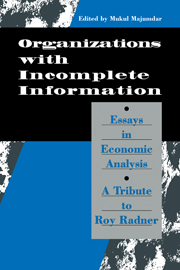Book contents
- Frontmatter
- Contents
- List of Contributors
- Preface
- Introduction: Searching for Paradigms
- 1 Equilibrium with Incomplete Markets in a Sequence Economy
- 2 The Existence of Rational Expectations Equilibrium: A Retrospective
- 3 Rational Expectations and Rational Learning
- 4 Dynamic Games in Organization Theory
- 5 The Equilibrium Existence Problem in General Markovian Games
- 6 A Practical Person's Guide to Mechanism Selection: Some Lessons from Experimental Economics
- 7 Organizations with an Endogenous Number of Information Processing Agents
- 8 A Modular Network Model of Bounded Rationality
- Index
6 - A Practical Person's Guide to Mechanism Selection: Some Lessons from Experimental Economics
Published online by Cambridge University Press: 09 October 2009
- Frontmatter
- Contents
- List of Contributors
- Preface
- Introduction: Searching for Paradigms
- 1 Equilibrium with Incomplete Markets in a Sequence Economy
- 2 The Existence of Rational Expectations Equilibrium: A Retrospective
- 3 Rational Expectations and Rational Learning
- 4 Dynamic Games in Organization Theory
- 5 The Equilibrium Existence Problem in General Markovian Games
- 6 A Practical Person's Guide to Mechanism Selection: Some Lessons from Experimental Economics
- 7 Organizations with an Endogenous Number of Information Processing Agents
- 8 A Modular Network Model of Bounded Rationality
- Index
Summary
Introduction
One of the most interesting developments in economic theory over the past 20 years has been the emergence of the theory of mechanism design. In short, mechanism design theory investigates whether it is possible to design an economic institution (represented formally as a game form) which, when imposed upon a set of individualistic agents, will lead them to take actions consistent with some a priori chosen performance (social welfare) criterion. Starting with the pioneering work of Hurwicz (1972), this theory has become increasingly rich in detail and analysis. (For a wonderful survey of the theory of full information mechanisms see Moore 1993). While this literature has attracted a great deal of interest, it has tended to remain rather abstract and theoretical despite its great potential applicability.
In the real world, however, the mechanisms designed by economists compete for adoption with others whose origins are either historical or are the objects of conscious design by noneconomists. By this I mean that, for any given allocation problem an organization might face, there might be a number of mechanisms available as solutions. The organization's leaders must then choose between these mechanisms based on their characteristics and if, for example, the mechanisms have different distributional consequences for the power groups within the organization, then a political battle may ensue with each power group lobbying for the adoption of their own mechanism. The mechanism that is ultimately chosen will emerge from this bargaining process within the organization. The process of mechanism design is therefore different from the process of mechanism selection. Mechanisms that seem natural to a well-trained economist may strike real-world decision makers as bizarre.
Information
- Type
- Chapter
- Information
- Organization with Incomplete InformationEssays in Economic Analysis: A Tribute to Roy Radner, pp. 208 - 238Publisher: Cambridge University PressPrint publication year: 1998
Accessibility standard: Unknown
Why this information is here
This section outlines the accessibility features of this content - including support for screen readers, full keyboard navigation and high-contrast display options. This may not be relevant for you.Accessibility Information
- 1
- Cited by
